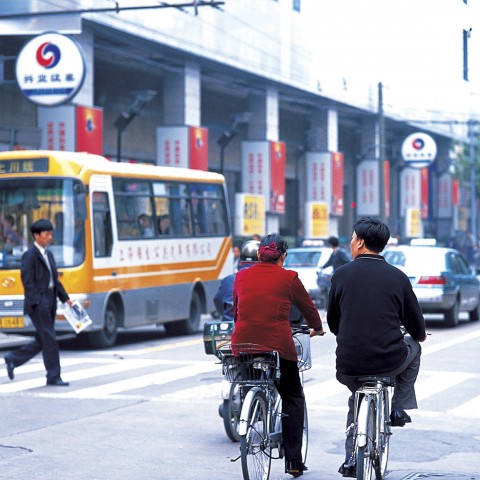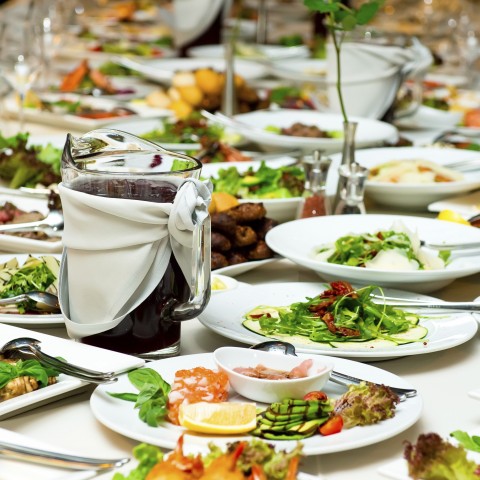
Have you ever wondered what the best way is to start learning Hungarian? We at the HungarianPod101.com family believe you should start by learning the top 100 Hungarian nouns.
Knowing the most commonly used nouns is essential in mastering any language. We use them in almost every sentence, and it’s impossible to share our thoughts without having a basic vocabulary. We use nouns in different situations, in relation to different topics. In today’s blog post, we’ve collected all the important Hungarian nouns by topic. Further, you’ll find plenty of useful tips and grammar facts regarding Hungarian plural nouns, gender, and sentence structure.
Learning about nouns in Hungarian is simple; you only need a good list. Make that first step toward becoming fluent in this beautiful language by reading our complete guide to Hungarian nouns!

Table of Contents
- Appliances
- Technology
- The World of the Internet
- Transportation
- Restaurant
- School Essentials
- Occupation
- The Family
- Body Parts
- Time
- Conclusion: How HungarianPod101.com Helps You Master Hungarian
1. Appliances

The most common household appliances are a bit more difficult to master in Hungarian. However, you’ll need them for everyday conversations. Let’s see the most important list of nouns in Hungarian for talking about appliances.
1- “TV” (tévé; televízió)
“I love watching the TV.”Szeretek tévét nézni.
Szeretek means “I love,” whereas nézni means “to watch.” Tévé is a common noun in Hungarian, so it’s worth keeping it in mind. Tévé is a widely used slang form, but as a formal counterpart, you can always use televízió instead.
2- “Fridge” (hűtő)
“Please open the fridge.”Kérlek nyisd ki a hűtőt.
Kérlek translates to “please” and nyisd ki stands for “open.” Hűtő is one of the most basic nouns in Hungarian.
3- “Air conditioner” (klíma; légkondicionáló; légkondi)
“I turn on the air conditioner.”Bekapcsolom a klímát.
In this sentence, bekapcsolom means “I turn on.” Bekapcsol is the main verb “turn on,” and -om notes the first person singular form. We added two other forms of the word: légkondicionáló essentially means the same, and légkondi is the slang counterpart of légkondicionáló.
4- “Washing machine” (mosógép)

“The washing machine is loud.” Hangos a mosógép.
Hangos stands for “loud” in Hungarian.
5- “Microwave” (mikrohullámú sütő)
“We don’t have a microwave.”Nincsen mikrohullámú sütőnk.
Nincsen stands for “don’t have,” as the Hungarian language skips “we” in this sentence. The -nk suffix makes the form possessive, and refers to the first person plural as well.
6- “Hair dryer” (hajszárító)
“I have a hair dryer.”Van hajszárítóm.
7- “Laptop” (laptop)
“I can’t find my laptop.”Nem találom laptopomat.
8- “Fan” (ventillátor)
“I turned off the fan.”Kikapcsoltam a ventillátort.
Kikapcsoltam means “I turned off,” as kikapcsol is “to turn off.” The -t notes the past tense and the -am ending is there to show the first person singular form.
9- “Vacuum cleaner” (porszívó)
“I turned off the vacuum cleaner.”Kikapcsoltam a porszívót.
10- “Stove” (tűzhely)
“I turned on the stove.”Bekapcsoltam a tűzhelyet.
Just like hűtő, tűzhely is another basic noun in Hungarian, especially for everyday conversations.
2. Technology
The world of technology is complicated in itself, not to mention when we have to talk about it in a different language—right? Don’t worry, we make it easy for you to master the most common Hungarian nouns in this category. Continue reading and learn Hungarian nouns for a technology talk.
11- “Tablet” (táblagép)

“Tablets are useful.”
A táblagépek hasznosak.
Hasznosak stands for “are useful” (referring to a plural noun), as hasznos means “useful” (referring to a singular noun).
12- “Mobile phone” (mobiltelefon)
“My children don’t have a mobile phone.”A gyermekeimnek nincsen mobiltelefonja.
13- “Headphones” (fejhallgató)
“I lost my headphones.”Elvesztettem a fejhallgatómat.
Elvesztettem means “I lost my.” As elveszt means “to lose,” -ett makes it past tense, and -em refers to first person singular.
14- “Charger” (töltő)
“I lost my charger.”Elvesztettem a töltőmet.
15- “Cable” (kábel)
“I can’t find the cable.”Nem találom a kábelt.
16- “Wi-Fi” (wifi)
“The Wi-Fi connection is poor.”Gyenge a wifi kapcsolat.
Kapcsolat translates to “connection,” whereas gyenge means “is poor.” Wifi is not only a common noun in Hungarian, but also very simple.
17- “App” (applikáció)
“I love using apps.”Szeretek applikációkat használni.
Szeretek stands for “I love,” and használni stands for “to use.” In today’s digital age, it’s a must to know about this popular Hungarian noun.
18- “File” (fájl)
“I save this file.”Elmentem ezt a fájlt.
Elmentem translates to “I save,” and ezt stands for “this.”
3. The World of the Internet

Fancy learning the most popular Hungarian nouns related to the Internet? Here’s our list of nouns in Hungarian related to the world of the Internet.
19- “Website” (weboldal)
“Here’s my website.”Itt van a weboldalam.
Itt van stands for “here’s,” and a weboldalam means “my website.” Weboldal is “website” and the -am ending stands for “my.”
20- “Image” (kép)
“I like this image.”Tetszik ez a kép.
Tetszik stands for “I like,” whereas ez translates to “this” in this sentence.
21- “Blog” (blog)
“I like this blog.”Tetszik ez a blog.
Just like wifi, blog is also very simple to learn, and it’s quite common in Hungarian. These technical terms are loanwords from English.
22- “Search” (keres)
“I searched for the most delicious chocolate cake recipe.”Rákerestem a legfinomabb csokitorta receptre.
Rákerestem means “I searched (on),” and the -re ending in receptre means “for.”
23- “Download” (letöltés)
“Click download.”Kattints a letöltésre.
In this sentence, kattints stands for “click.”
Looking to read more about the Internet in Hungarian? Check this.
4. Transportation
Transportation is something we talk about on an everyday basis. Here’s an important list of nouns in Hungarian when it comes to getting around.
24- “Airplane” (repülőgép)
“I’m coming by airplane.”Repülőgéppel jövök.
Saying which vehicle you’re using is easy in Hungarian. Just add the ending -al or -el after the vehicle, to state that you’re coming “with” it. In this sentence, repülőgéppel stands for “by airplane,” whereas jövök means “I’m coming.”
25- “Train” (vonat)
“I’m coming by train.”Vonattal jövök.
26- “Subway” (metró)
“I’m coming with the subway.”Metróval jövök.
27- “Bus” (busz)
“They’re coming by bus.”Busszal jönnek.
28- “Taxi” (taxi)
“She’s coming by taxi.”Taxival jön.
29- “Bike” (bicikli)
“I come by bike.”Biciklivel jövök.

30- “Airport” (repülőtér)
“The airport is far away.”A repülőtér messze van.
Messze stands for “far away,” and van translates to “is (to be).”
31- “Train station” (vonatállomás)
“The train station is nearby.”A vonatállomás közel van.
32- “Bus stop” (buszmegálló)
“The bus stop is 100 meters away.”A buszmegálló 100 méterre van.
33- “Road” (út)
“The road is long.”Az út hosszú.
5. Restaurant
Going to the restaurant is always super fun, especially if we don’t have that language barrier when ordering. Here are the most common Hungarian nouns you’ll need when eating out.
34- “Table” (asztal)
“The table is big.”Az asztal nagy.

35- “Menu” (menü)
“The menu is long.”A menü hosszú.
36- “Bill” (számla)
“The bill is already on the table.”A számla már az asztalon van.
37- “Fork” (villa)
“Don’t use the fork!”Ne használd a villát!
In this sentence, ne stands for “not” and használd stands for “use” (imperative).
38- “Knife” (kés)
“Don’t use the knife!”Ne használd a kést!
39- “Spoon” (kanál)
“Please use the spoon!”Kérlek használd a kanalat!
40- “Plate” (tányér)
“Don’t drop the plate!”Ne ejtsd le a tányért!
41- “Glass” (pohár)
“We don’t have a glass.”Nincsen poharunk.
42- “Water” (víz)
“Drink enough water.”Igyál elegendő vizet.
43- “Tea” (tea)
“Do you like tea?”Szereted a teát?
6. School Essentials
The beginning of the school year is always challenging, so it might come in handy to know the most popular Hungarian nouns you can use during this season. Take a look at a short list of nouns in Hungarian to master the topic of school!
44- “High school” (gimnázium)
“This is a high school.”Ez egy gimnázium.
Ez stands for “this,” egy means “a,” and the two together (ez egy) means “This is a…”
45- “Classroom” (osztályterem)
“This is a classroom.”Ez egy osztályterem.
46- “Backpack” (iskolatáska)
“My backpack is huge.”Az iskolatáskám hatalmas.
47- “Pen” (toll)
“This is a red pen.”Ez egy piros toll.
48- “Teacher” (tanár)
“She’s a teacher.”Ő egy tanár.
In this sentence, ő stands for “she.” Please note that ő could stand for either “he” or “she,” depending on the context.

49- “Student” (diák)
“He’s a student.”Ő egy diák.
50- “Homework” (házi feladat)
“My homework is complicated.”A házi feladatom bonyolult.
51- “Classmate” (osztálytárs)
“She’s my classmate.”Ő az osztálytársam.
52- “Exam” (vizsga)
“This is a long exam.”Ez egy hosszú vizsga.
53- “Project” (projekt)
“The project starts today.”A projekt ma kezdődik.
7. Occupation

Whenever you meet someone new, the first thing they’re going to ask you is probably what your occupation is. The names of occupations are important Hungarian nouns, so here’s a list for you:
54- “Doctor” (orvos)
“He’s a doctor.”Ő orvos.
55- “Lawyer” (ügyvéd)
“The lawyer works a lot.”Az ügyvéd sokat dolgozik.












